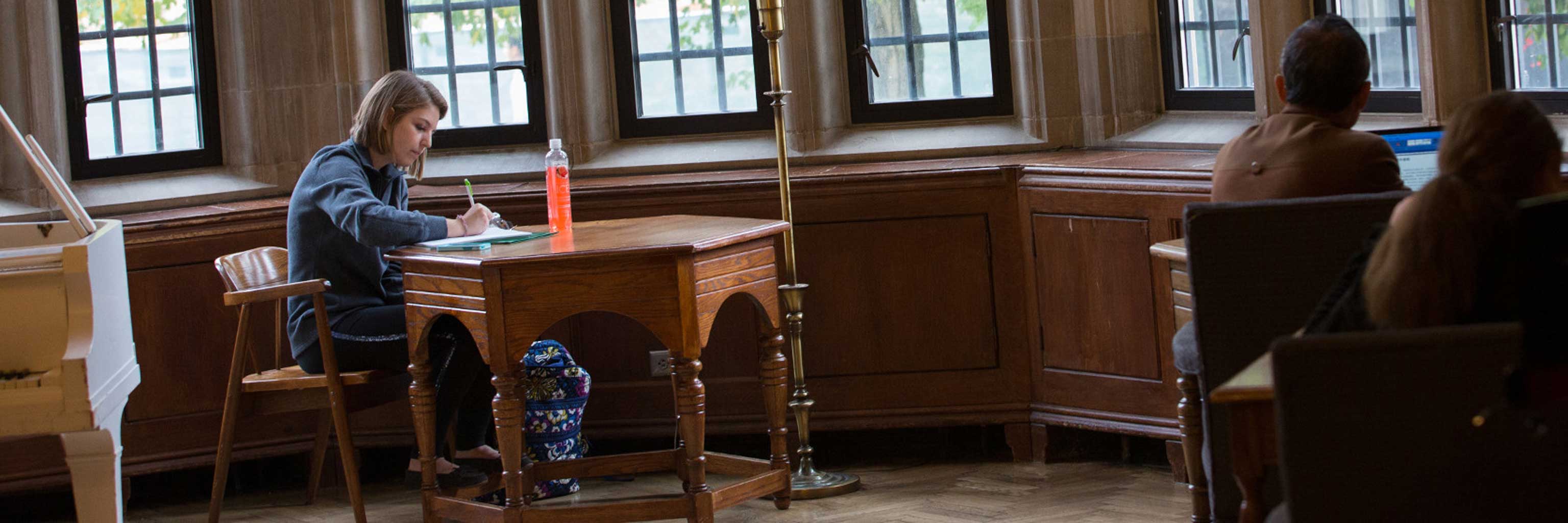All Medieval Studies Minor and Certificate recipients must complete four courses of 3 to 4 credits each, in a topical cluster.
- Each of the 4 topical clusters for the Medieval Studies minor and certificate require 3 cluster-specialization courses and 1 elective. These 4 courses cannot be double-counted for the Ph.D. major.
- At least one course should be outside your home department.
Courses in which a student receives less than a B (3.0) will not count toward the minor.
- Medieval Languages
The "Languages" cluster prepares you to take a language-teaching career path.
- 3 courses distributed between 3 different languages
- 2 of the 3 language courses should include training in pre-1500 forms of that language. (e.g., Medieval Arabic, literary Chinese, Coptic, Old/Middle French, Classical Greek, Old/Middle English, Hebrew, Old Irish, Italian, classical Japanese, Latin, Old Norse, Old Occitan, Persian, Syriac, Sanskrit, Old Tibetan, Middle Welsh; this list is not exhaustive but depends on course availability).
- A 4th elective course.
Example Program of Studies: 2 pre-modern Latin courses focused on grammar and readings, 1 course with some pre-modern Spanish literature, and 1 course with some Old-French literature.
- CLAS-L540: Readings in Medieval Latin (pre-1500 Latin)
- HISP-S518: Medieval Iberian Literature and Culture (readings in several pre-1500 languages)
- CLAS-L532: Introduction to Medieval Latin (pre-1500 Latin)
- FRIT-F615: The Troubadours (Studies in Medieval French Literature) (readings in pre-1500 French)
- Global Medieval Studies
The "Global Medieval Studies" cluster addresses research trends in diversity and global interaction and prepares you to consider both the value of a diversifying Medieval Studies and to complicate the idea of "global medieval" as an imposition of Western European norms.
- 3 courses focused on some aspect of the period between 350 C.E. and 1500 C.E. in 3 different geographic regions
- At least 1 course should have a geographic focus outside the Mediterranean and Western Europe.
- A 4th elective course.
Example Program of Studies: 2 courses in classical East Asian studies, a central Eurasian pre-modern course, and a medieval European course.
- HISP-S518: Spanish Medieval Literature (Europe)
- CEUS-551: Prophets, Poets, Kings: Iranian Civilization (central Asia)
- EALC-E505: Premodern Japanese History (east Asia)
- CEUS-R597: Empires of the Silk Road (east Asia)
- Interdisciplinary Methods for Medievalists
The "Interdisciplinary Methods" cluster acknowledges the wide variety of methods medievalists draw on in both research and teaching practices.
- 3 courses focused on some aspect of the period between 350 C.E. and 1500 C.E. using 3 different analytical methods (e.g., 1 in historical methods, 1 in anthropological methods, 1 in comparative literature)
- 1 course of the student's choice on either:
- any aspect of medieval studies
- methodological training applicable to the student's medieval research interests (e.g., computational linguistics)
Example Program of Studies: 2 language-focused courses (1 classics, 1 comparative literature), a music course and a philosophy course.
- CLAS-L505: Latin Grammar, Composition and Rapid Readings (classics)
- CMLT-C523: Medieval Literature: Defining the Human in Medieval Europe (comparative literature)
- MUS-M651: Medieval Music (music)
- PHIL-P515: Medieval Philosophy (philosophy)
- Medievalisms
The "Medievalisms" cluster addresses the public-humanities aspects of medieval studies and encourages research on the form and public impact of medieval tropes in popular culture.
- 3 courses focused on the period between 350 C.E. and 1500 C.E.
- 1 course focused on the reception of medieval concepts in a post-1500 setting
Example Program of Studies
- EALC-E505: Premodern Japanese History (east Asia)
- HISP-S518: Medieval Iberian Literature and Culture (readings in several pre-1500 languages)
- HIST-H610: The Crusades (medieval Europe)
- MSCH-T580: Interactive Storytelling and Games (application of pre-modern history to game narratives)
Additional Certificate Requirements
In addition to the topical-cluster requirements, certificate recipients will
- take five additional 3- or 4-credit courses with a medieval-studies focus for a total of nine courses
- demonstrate advanced proficiency in at least one medieval language (see the Medieval Languages topical cluster for a sample list). Advanced proficiency in a language can be established through for-credit completion of two advanced courses in philology or literary studies of the language in question (which can count toward the certificate), through very specific undergraduate language courses listed in the graduate bulletin, or by appropriate advanced examination.

 The College of Arts
The College of Arts